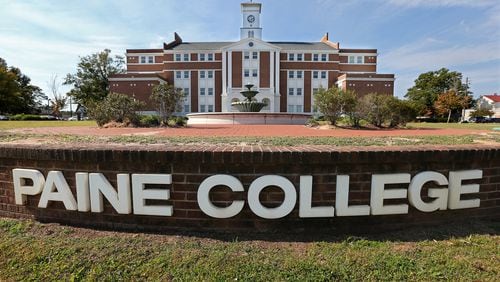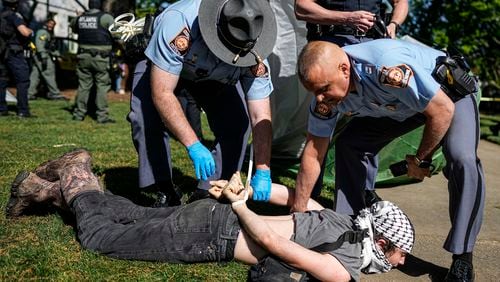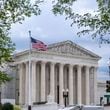Paine College’s new president is a religious man who’s attempting a Hail Mary to keep his school afloat.
Jerry Hardee’s plan includes an unusual recruiting tool: freshmen pay nothing for room and board. Hardee also wants to build new dorms for 750 students, although he said Paine’s enrollment is 425.
“It’s a chance, but it’s a good chance on my part,” Hardee, 79, said in an interview.
Paine College, just a few miles from the famous Augusta National Golf Club, is in peril. Enrollment has declined by more than 50 percent since 2010. Its six-year graduation rate is 22 percent, according to federal data, barely one-third the national average for all colleges. It’s in a yearlong legal battle with the Southern Association of Colleges and Schools to keep its accreditation that caused enrollment to dive. Paine had 922 students when SACS put the college on probation in 2014.
Paine administrators and student leaders, though, tell an upbeat story. They say the worst of Paine's financial troubles are past; it has strong academics and note many graduates have carved out successful careers, such as DeKalb County CEO Michael Thurmond.
“From an aesthetic viewpoint, you might not think it’s the best school … but I believe we’re one of the best HBCUs in the country, period,” said Terrance Rodgers, 23, a senior.
Said Thurmond, its board chairman: “I have faith that Paine College will survive.”
As part of The Atlanta Journal-Constitution's three-part series examining the viability of the nation's Historically Black Colleges and Universities, the newspaper visited Paine to get a sense of how some HBCUs facing significant financial and academic challenges are responding. The AJC interviewed several Paine officials, students and reviewed documents involving its accreditation.
Paine, despite its challenges, is still graduating students. Its students mentor high school students. Paine educates much of the region's black middle class.
Hardee, who came out of retirement to take the presidency, said it’s critical for places like Paine to survive to help low-income students desiring a chance to better themselves with a college degree. Nearly 90 percent of its students receive federal student loans, which is about twice the national average.
“You need HBCUs because they provide opportunities for a lot of people who cannot afford to go to college,” he said.
Founded in 1882, Paine is one of nine accredited HBCUs in Georgia. It was founded by Methodist church leaders, black and white, with donations — including pennies from former slaves. Paine had a high school in its early days that, for decades, was the only such school for black students in Augusta.
Paine sits quietly near a busy stretch of town, close by the Augusta University Medical Center. The 65-acre campus consists primarily of red brick dorms — some largely empty — office buildings and a cavernous chapel with a cream-colored walls and purple cushioned pews (the school colors) where students gather once a week for an assembly.
The program at one assembly included a presentation on the Harlem Renaissance and an interpretative dance that drew loud cheers from the 200 or so students there. Hardee invited visitors to drop in on any classrooms that afternoon. But some classes had just a handful of students.
Paine’s current problems, Hardee and others say, began after the Obama administration tightened regulations to get student loans in 2011.
Some students held a protest in 2012, complaining of financial aid checks that bounced and of mold and leaks in their dorms. Paine’s net assets were in the red four consecutive years, SACS said. And court records show the college had a $10 million shortfall in 2014.
Paine admits some wounds were self-inflicted. “Questionable financial decisions were made by prior administrations. As a result, the college’s financial condition has been severely compromised,” it said on its website. One such decision, many agree, was a failed attempt to restart its football program. Paine also delayed making cutbacks other colleges had done during the Great Recession.
The Southern Association of Colleges and Schools pulled Paine’s accreditation in September 2016, about the worst thing that can happen to a college. Unaccredited schools aren’t eligible for federal student aid, and degrees conferred may carry no weight with employers or graduate schools. Paine obtained an injunction to stop SACS from revoking accreditation, saying the agency did not accept audited statements that show the college was in the black. Hardee said he’s working on a settlement with SACS.
Thurmond, like many Paine students, was part of the first generation in his family to attend college and believes it’s his duty to help the school at this critical juncture. Thurmond’s mother wanted him to become a minister, so he majored in philosophy and religion. He initially worked as a dishwasher in the school cafeteria to pay his tuition.
He credits Paine, where he ultimately became the student body president and editor of the campus newspaper, with giving him, the son of a sharecropper, self-confidence.
When SACS came calling in 2016, Thurmond reached out to the man who defeated him in the 2010 U.S. Senate race for help, Johnny Isakson, because of the senator’s connections in Washington and also his connections to Paine. Isakson spoke at a Paine commencement. That September, Thurmond, Isakson and about 30 prominent business and political leaders met to discuss what they could do for Paine. Several offered donations that day.
Thurmond’s role has included legal advice and mentoring students like Paine senior Deonte’ Moses.
Moses left Paine in 2015, recruited to play basketball at another college, but he returned the following semester. He’s started a campus organization called “Devoted Disciples” that’s conducted spiritual outreach on campus.
“Our institution lies in the students’ hands. … You can’t just leave,” said Moses, 24, who was recently accepted to Emory University’s Candler School of Theology.
Moses wants someday to become a minister, a path Thurmond wound up not following, and also to work in DeKalb County government, something Thurmond knows a lot about.
“I see myself in him,” Thurmond said. “I promised him I’ll find a place for him.”







